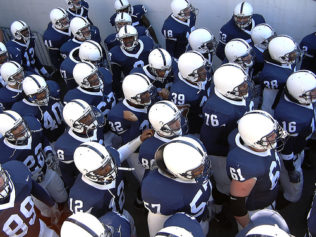Still reeling from the content of the Freeh report, Emmert did not dismiss the notion of issuing the so-called “death penalty” against Penn State, asserting that the unprecedented nature of the Sandusky scandal could warrant extreme punishment.
“This is completely different than an impermissible benefits scandal like happened at SMU, or anything else we’ve dealt with,” Emmert said. “This is as systemic a cultural problem as it is a football problem. There have been people that said this wasn’t a football scandal.
“Well it was more than a football scandal, much more than a football scandal. It was that but much more. And we’ll have to figure out exactly what the right penalties are. I don’t know that past precedent makes particularly good sense in this case, because it’s really an unprecedented problem.”
Emmert also said that he expects to hear back from Penn State “within weeks” regarding questions the NCAA has issued about the case, including the issue of institutional control. He consistently has maintained that the NCAA will not determine whether violations occurred until receiving the school’s response.
“We’re in active discussions with Penn State right now, and I need to get a response back from them soon, right away,” Emmert said. “And then we’re going to make that determination, and then we’ll see where we go here.”

